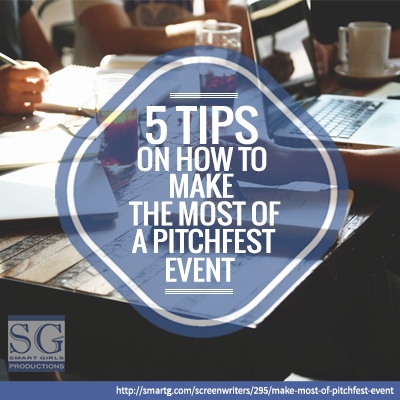 One of the most exciting and scary things a screenwriter has to do for their careers is pitch their screenplay live to a Hollywood VIP who could potentially put them in the middle of the real Hollywood movie game.
One of the most exciting and scary things a screenwriter has to do for their careers is pitch their screenplay live to a Hollywood VIP who could potentially put them in the middle of the real Hollywood movie game.
Over the years, more opportunities to pitch live to a collection of executives at Pitching Events have been cropping up, and it really is a great way to get in front of several execs in a very short period. The key to these events, however, is not just getting the request to read, but to make the most of the event and leverage it for the long-term in your career.
Here are five ways to make the most of a Pitchfest Event.
1. Pick out what execs you will meet with ahead of time and research them.
This will help you choose the best execs to pitch to for your script. And if you have several scripts, it will also help you decide which one or two would be the best to pitch to a given company.
If a literary agent or manager or a producer says they would like to read your script, get it to them as quickly as you can. Get it to them within 24 to 48 hours if possible. These execs, as everyone these days, are extremely busy and constantly deluged with more scripts. They will forget you extremely fast if you don’t get back to them, so send your script to them ASAP.
This also implies that your script should be ready to go when you pitch, so that you can send it to them immediately. Don’t pitch the script unless you can get your script to them in a few days – unless the timing is such that you can’t miss the opportunity to pitch but still need a week or two to polish your script.
In that case, just tell them you’re doing a final polish and will send it to them in a week or so when you finish. It would be better to have the opportunity to pitch with a delay in getting it to them than to miss it altogether. But if you can, get your script in tip-top shape ahead of time and deliver to them within 24 hours.
Most likely there will be so many execs that you won’t get to all of the ones you want. OR there will be so many writers competing for the exec’s time that you won’t get to them.
You can still maximize the Pitching Event even if you don’t get to meet with them by following up with the execs afterwards. Let them know that you tried to get to pitch to them and weren’t able to because there were so many writers ahead of you.
The main thing here is that you can use the pitchfest as an entrée to connecting with them. They hear so many pitches and have the pitchfest on their minds afterwards, so take advantage of the opportunity.
Given the number of scripts and writers, both professional and aspiring, the odds are very strong that you will not sell your script just because you pitch it. Most writers try one thing to market their scripts and if they don’t sell it, they assume all is lost.
The reality is that you build a career by building your list of contacts one at a time over time. As you get more pitches, treatments, outlines, and scripts, you can go back to those same contacts again and again.
For every person you meet, store their information in a database and return to pitch to them every time you write a new project. If you place highly in a script contest, send them a note. Work on establishing your name as a reliable source of good projects over time.
No matter how good your script is, if you don’t pitch it well, no one will know that it is good. If you are going to pitch live to Hollywood execs, make sure you do justice to your story by preparing a strong pitch ahead of time.
There’s nothing that would be sadder for you than to actually have a great story and miss out on great opportunities because you cannot pitch it properly.
First write a great pitch that excites people about your story. Then keep practicing your pitch aloud until you feel smooth and comfortable with it. This will give you your best chance of producing the results you want at the Pitching Event.
For guidance on how to craft a pitch, check out my 60-page ebook “Learn To Pitch Your Screenplay: 57 Tips” that also comes with a 75-minute set of 4 videos from an event that I spoke at on “How to Master Your Pitch.”
Additionally, if you have a pitching event coming up, you may want to consider a one-on-one pitch coaching session where we can work on the best way to pitch your specific projects.
I’d love to hear from you about whether you found this helpful and any questions you might have about pitching.
Thanks for reading!


